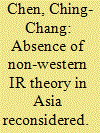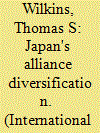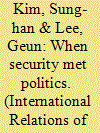|
|
|
Sort Order |
|
|
|
Items / Page
|
|
|
|
|
|
|
| Srl | Item |
| 1 |
ID:
101959


|
|
|
|
|
| Publication |
2011.
|
| Summary/Abstract |
This paper critically examines an ongoing debate in International Relations (IR) as to why there is apparently no non-Western IR theory in Asia and what should be done to 'mitigate' that situation. Its central contention is that simply calling for greater incorporation of ideas from the non-West and contributions by non-Western scholars from local 'vantage points' does not make IR more global or democratic, for that would do little to transform the discipline's Eurocentric epistemological foundations. Re-envisioning IR in Asia is not about discovering or producing as many 'indigenous' national schools of IR as possible, but about reorienting IR itself towards a post-Western era that does not reinforce the hegemony of the West within (and without) the discipline. Otherwise, even if local scholars could succeed in crafting a 'Chinese (or Indian, Japanese, Korean, etc.) School', it would be no more than constructing a 'derivative discourse' of Western modernist social science.
|
|
|
|
|
|
|
|
|
|
|
|
|
|
|
|
| 2 |
ID:
101961


|
|
|
|
|
| Publication |
2011.
|
| Summary/Abstract |
East Asia has experienced a drastic decline in incidences of warfare and has had exceptionally low levels of battle deaths after 1979. However, East Asian peace had already begun in 1967 inside ASEAN. Is it possible that East Asian peace began in ASEAN and spread to the rest of East Asia? This is the question that this article aims to tackle by showing the association between a reasonable and plausible explanation, the ASEAN Way, and East Asian peace after 1979. The argument about the role of the ASEAN approach in the pacification of East Asia is based on an examination of the patterns of frequency of conflicts, numbers of battle deaths and conflict termination. In this kind of examination, it seems that the recipes for peace in East Asia after 1979 are similar to those of ASEAN after 1967, and that their relationship to conflicts was also very similar.
|
|
|
|
|
|
|
|
|
|
|
|
|
|
|
|
| 3 |
ID:
101963


|
|
|
|
|
| Publication |
2011.
|
| Summary/Abstract |
As part of its movement toward 'normal country' status, Japan has begun to engage in a policy of alliance/alignment restructuring and diversification. This is a twin-track policy - the reconfiguration of existing allied relationships and the creation of new cooperative bilateral links. In recent years, Tokyo has deepened its ties with the United States and Australia on the one hand, while cultivating new partners such as India, as well as several Southeast Asian states. This article examines the nature and dynamics of two of the most important new strategic partnerships: India and Australia. Through a comparative analysis, it seeks to account for their formation, structure, and prospects using a specifically designed model of 'strategic partnership' drawn from Organizational Theories literature. It concludes that these strategic partnerships represent a major platform of a more robust and comprehensive security policy on the part of Japan, forged in response to a shifting international environment in the Asia-Pacific region.
|
|
|
|
|
|
|
|
|
|
|
|
|
|
|
|
| 4 |
ID:
101964


|
|
|
|
|
| Publication |
2011.
|
| Summary/Abstract |
Takashi Inoguchi once stated that Japan's international relations theory is characterized by its exclusive disciplinary orientation toward constructivism. Nishida Kitaro is widely recognized as one of such constructivists. In this article, I argue that Nishida's theory of world history was based on the perception of subjectivity of contradiction, and was thus exclusively culture-oriented. By emphasizing cultural aspects, he tried to disturb the coherence and consistency of the colonialist discourse on which the dominant regime of Japan of the time was entirely reliant. However, because Nishida's theory of world history completely lacked the recognition of the material relations of the colonizer and the colonized, as a direct consequence of his understanding of the term 'culture', his attempts were unrealized.
|
|
|
|
|
|
|
|
|
|
|
|
|
|
|
|
| 5 |
ID:
101962


|
|
|
|
|
| Publication |
2011.
|
| Summary/Abstract |
This paper analyzes US-Japan-Australia security relations in the 1990s. Since the establishment of the Trilateral Strategic Dialogue (TSD) in 2005, there have been a growing number of studies which focus on the TSD or bilateral security relations between Japan and Australia ( Terada, 2006; Williams and Newman, 2006; Tow et al., 2007; The National Bureau of Asian Research, 2008). The announcement of the Joint Security Declaration between Japan and Australia in 2006 also received wide attention from researchers interested in the security policies of each country or Asia-Pacific security in general ( Bisley, 2006; Sato, 2008; Cook and Shearer, 2009). These studies focus mainly on the current development of US-Japan-Australia or Japan-Australia security relations in various dimensions, such as peacekeeping, non-proliferation, disaster relief, and other forms of multilateral cooperation. In particular, many studies emphasize that Japanese and Australian contributions to the US-led 'global war on terror' significantly upgraded their respective alliance relations, leading to the creation of the TSD ( Jain and Bruni, 2006; Wolton, 2006). In comparison, few studies exclusively focus on security relations between the three countries in the 1990s.
|
|
|
|
|
|
|
|
|
|
|
|
|
|
|
|
| 6 |
ID:
101960


|
|
|
|
|
| Publication |
2011.
|
| Summary/Abstract |
This study delves into an empirical case analysis of the desecuritization process of the North Korean threat under the Kim Dae-jung government. Unlike previous studies, it analyzes how domestic and international actors desecuritized traditional threats by taking the pluralistic political processes of a democratic polity seriously. This was the process of competition between different political coalitions and the process of transformation from issues of high politics into issues of low politics. It remains to be seen whether the Kim Dae-jung government's desecuritization of North Korean threats was a deep or a shallow one, but it appears to be clear that the desecuritization of North Korean threats by the Kim Dae-jung government paved the way for another 5 years of progressive government with Roh Moo-hyun's 'unexpected' victory in the 2002 presidential election.
|
|
|
|
|
|
|
|
|
|
|
|
|
|
|
|
|
|
|
|
|